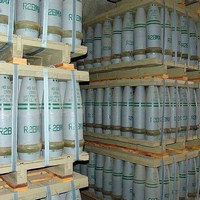The impending U.S. military strike against Syria due to the Syrian army’s massive use of chemical weapons against innocent civilians underscores the difficulties involved in using military force in such situations. It would be far better and less costly to strengthen the Chemical Weapons Convention and other nonproliferation tools than to apply military power to eliminate rogue states’ existing chemical weapons (CW) materials or try to limit their use.
Obama administration officials have cited various reasons for launching a limited attack: to punish the Syrian government for its past CW use; to deter further use; and, in case deterrence fails, to degrade the Syrian regime’s ability to launch another attack.
In the case of current proliferation threats such as Iran and North Korea, the Obama administration presumably wants to re-establish the credibility of U.S. red lines. President Barack Obama declared any use of chemical weapons by the Syrian government as one such red line. He has issued similar warnings to North Korea—not to resume testing of its long-range ballistic missiles, not to test more nuclear weapons and especially not to transfer its nuclear weapons, or their key technologies or components, to other countries. Obama has also warned Iran not to develop nuclear weapons. Pyongyang has arguably crossed some of those red lines, whereas Tehran is moving close.

